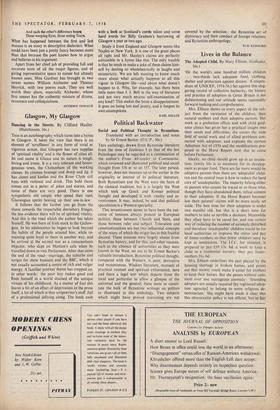Political Backwater
Social and .Political Thought in Byzantium. Translated with an introduction and notes by Sir Ernest Barker. (0.U.P.. 30s.)
Tests anthology, drawn, from Byzantine literature from the time of Justinian I to that of the last Pakeologus may be regarded as a continuation of the author's From Alexander to Constantine, which reviewed and illustrated political and social thought from 336 BC to no 337. The later period, however, does not measure up to the earlier in the originality or interest of its political literature.. Both Byzantium and the West were the heirs of the classical tradition, but it is largely the West which took up Greek and Roman political thought and developed it with vitality and in- ventiveness. It may, indeed, be said that political • speculation is a Western speciality.
This inventiveness seems to have been the out- come of tensions always present in European politics, those between Church and State, and those between ruler and subject. Toleration and constitutionalism are but two influential concepts of the many of which the origin lies in this fruitful discord. These tensions were largely absent from Byzantine history, and for this, and other reasons, such as the absence of universities as they were known in the West, set out in Sir Ernest Barker's valuable introduction, Byzantine political thought, compared with the Western, is poor, derivative and monotonous. Wisdom literature, manuals of practical counsel and spiritual exhortation, here and there a legal text, which departs from the local and particular to allow a glimpse of the universal and the general, these seem to consti- tute the bulk of Byzantine writings on politics as illustrated in this anthology. TWo subjects which might have proved interesting are not
covered by the selection : the Byzantine art of diplomacy and their conduct of foreign relations, and Byzantine anthropology.
ELIE KEDOURIE


































 Previous page
Previous page